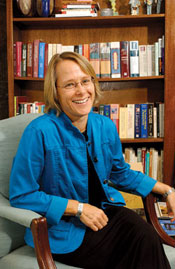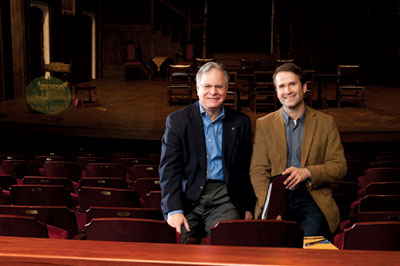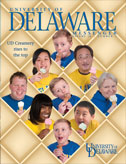Humanities center supports creative collaboration

ON THE GREEN | Research in the humanities may seem more remote from everyday life than research in some other disciplines, but a new center in the College of Arts and Sciences is supporting cross-disciplinary research collaborations in the arts, humanities and social sciences and strengthening the University’s public humanities programming.
“The humanities, broadly defined, play a fundamental role in the intellectual life of a great university,” says Ann Ardis, senior associate dean of the humanities in UD’s College of Arts and Sciences and director of the recently established Interdisciplinary Humanities Research Center. “The most innovative of these types of centers seek to break down the barriers between the ‘ivory tower’ and the world at large, engaging faculty, students and the general public in matters of broad humanistic concern.”
Ardis says the core mission of the new center, which has seed funding from the Unidel Foundation, is to:

• Strengthen humanities research, enhance its visibility both regionally and nationally and provide support for initiatives involving multidisciplinary research teams and inter- and intra-institutional partnerships;
• Support creative, intellectually ambitious course development and curriculum innovations designed to bring cutting-edge research into the classroom and engage more undergraduates in humanities research; and
• Significantly enhance UD’s public humanities programming, thereby contributing to the University’s overarching goal of making Newark a destination—an intellectually and culturally rich and exciting environment for students, faculty and the community.
In a 2004 report, titled Reinvigorating the Humanities: Enhancing Research and Education on Campus and Beyond, the American Association of Universities noted the importance of the humanities.

“No university can aspire to recognition as one of the country’s great public universities which is not recognized as a leading center of research and teaching in the arts and humanities,” the report said.
Ardis says humanities research centers across the country play a key role in strengthening the intellectual and creative life of university communities. Some, such as Stanford University’s Humanities Center, devote most of their resources to bringing scholars from other institutions to campus for residencies as brief as several days or as long as an academic year. Others, such as the Doreen B. Townsend Center for the Humanities at the University of California Berkeley, are primarily committed to stimulating dynamic cross-disciplinary exchanges among researchers and students on their home campus.
UD’s Interdisciplinary Humanities Research Center has launched its activities through three internal grant programs: one supporting multidisciplinary research teams; one for visiting artists and scholars; and one supporting cross-disciplinary teaching and public programming collaborations.
In December, the center announced its initial set of four awards, which were in the category of multidisciplinary research teams. One of the research projects, “Political Communication and Engagement in the 21st Century,” is an investigation of the impact that digital media technologies are having on citizens’ engagement with politics and involves faculty in the departments of Communication and of Political Science and International Relations.
Another grant supports the establishment of an interdisciplinary research cluster focused on investigating issues of social justice in the Americas and involves faculty in the departments of Women’s Studies, Art History, Latin American Studies, Anthropology, Black American Studies, Foreign Languages and Literatures, English and the School of Education.
The third multidisciplinary research grant supports the development of a symposium to be held on the UD campus related to “Live Cinema Live,” an upcoming exhibition and visiting artists series at the Philadelphia Museum of Art; it involves faculty in UD’s Department of Art and curators at the museum.
The fourth collaborative research grant will support the May 2010 meeting of the national Consortium for American Material Culture Studies at the University and Winterthur Museum and Country Estate and the creation of a set of workshops for UD faculty and graduate students about teaching with and learning from historical artifacts. It involves faculty in the departments of History, English and Art and the Center for Material Culture Studies.
Earlier this spring, a second set of grants was announced. One, to support a distinguished visiting artist, enables the departments of Theatre and English to commission a prominent playwright to create a play for the UD Resident Ensemble Players to perform. The playwright will also guest teach some courses and deliver lectures to students and the public.
Two other grants support “Integrated Semester” projects. One, led by faculty in the departments of Computer and Information Sciences and of Art, will engage advanced undergraduate visual communication and computer science students in the design of “serious games” about issues of sustainability. The other “Integrated Semester” project, led by faculty in Art History and English, will involve graduate students’ co-enrollment in two seminars focused on questions of representation, globalization and race in the art and literature of the American Revolution.





